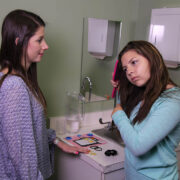What To Expect From Your ABA Clinic
As a parent, we always want to ensure that the quality of any service we are getting for our children is of good quality. This should be no different for the ABA clinic and services your child is receiving. The question that can sometimes be hard to answer is “what should my expectations be?” It is important to know what you should expect when receiving ABA services.
Here is a list of things you should expect from your ABA Clinic and provider:
Daily Notes
- In general, you can expect to receive a note each day regarding what your child did for that day. This will give you an idea of what they are working on each day and the areas they may need some additional assistance with. If this is not something being provided ask your Clinic Director or BCBA.
Cameras Throughout The Facility
- Not all ABA facilities have a camera system, however many do. This is a good thing for an ABA company to have as it allows parents to observe their child’s session without having to be in the room (which can in some cases inadvertently disrupt the session). Behavior TLC has an open-door policy for parents to observe via our cameras. This is a great way for parents to get to know what their child’s program involves as well as feel comfortable with their child being in our clinic. Having a camera system can also be extremely useful when doing parent training and when training/evaluating technicians.
Parent Training
- Training should be available for parents and caregivers at least monthly. In many cases, we do parent/caregiver training up to 1 time per week. This training is very important in helping your child generalize the skills they are learning with us as well as ensuring everyone is doing things similarly across environments (home, community, school, etc.).
- Parent/caregiver training should also be provided in any settings applicable for that child and family. This includes the home and community. Initially, parent training tends to start in the clinic, and then as needed home and community training is done later. This can include anything that parents would like assistance with. Some examples are: going to doctor appointments, tolerating a dental exam, tolerating a haircut, working on responding to and reducing elopement (running off) in public places like at the store, self-care skills such as showering which cannot be easily targeted in the clinic setting, etc.
Progress Reports
- Updates on your child’s progress should be provided at least quarterly. This should include updates and a review of all areas of your child’s program.
- Assessments
- Skills assessments such as the VB-MAPP (Verbal Behavior Milestones, Assessment, and Placement Program) or ABLLS (Assessment of Basic Language and Learning Skills) should be done at least every 6 months. This will typically be done and coincide with when new documentation has to be submitted to your insurance company (if you are using insurance) to renew/continue authorization for treatment.
Insurance
- When initially starting with an ABA clinic, they should do a verification of your benefits. This will give you an estimate of how much you will be responsible for paying for services. The information you should get from this should be if services with the company are in-network or out of network, if you have a co-pay and the amount if you have/what your deductible amount is, how much the insurance company covers after the deductible (e.g. all services covered at 80% after deductible met), and what your out of pocket maximum is (this is generally the maximum amount of money you would pay for services in a calendar year and once it is met, all services would then be covered at 100%).
- Once ready to start your ABA provider will submit paperwork to get authorization from your insurance company to do the initial assessment.
- After the initial assessment is done, your ABA provider will then submit paperwork to get authorization for ongoing treatment. This authorization typically lasts for 6 months.
- In many cases, your ABA provider will also assist you with any issues with your insurance. This can range from claims being denied to appealing a partial or full denial of services. In general, this is something you should expect assistance with from your ABA provider.
Accountability
- In this area, your ABA provider should be doing body checks when your child enters the clinic and before they leave the clinic. A body check is a quick scan of the body in which any type of mark (scratch, bruise, rash, etc.) is recorded. This is done in order to ensure that we are aware of any current marks on the body and so that we can determine if any new marks occurred while at the clinic.
- If an injury should occur at an ABA clinic (this is generally defined as any situation in which a persistent red mark, bruise, scratch, or any incident involving the head (bumping into something, etc.) an incident report should be filled out. This report should include the time of the incident, description of the incident, the treatment given/needed, a description of the injury, any preventative measures that will be put in place, and the information of the person filling out the report, providing treatment, and a signature by a supervisor. An ABA provider will also have the parent/caregiver sign this document and then provide a copy of this document to the parent/caregiver.
- In many cases, ABA providers will train their employees in Crisis Management. Crisis management programs typically involve training on things that can be done to prevent a crisis, de-escalation techniques, and physical safety and management. This gives employees additional skills that can be utilized in the event of crisis behavior in which we need to intervene so that a child doesn’t seriously hurt themselves or someone else. Some of the common Crisis Management programs used within ABA Clinics are Safety Care (Behavior TLC utilizes this), PCM, MANDT, SAMA, CPI, and PMAB.
- Your ABA provider should also have emergency procedures in place. This would include procedures in the event that there is a fire, unsafe/dangerous person in the area, an intruder in the building, inclement weather, and medical emergencies.
- BCBA’s need to complete ongoing education and obtain CEU’s to maintain their certification. RBT’s are also required to maintain their certification by renewing every year and maintain ongoing supervision.
- Staff should complete CPR and BLS (Basic Life Support) training and renew every year.
Your Child’s Program
- The BCBA that is working with your child should work collaboratively with you to create their program. It is important that the things we work on align with what is important to you as a family.
- Your child’s program is also fluid and should change as needed for your child. Your BCBA should be spending approximately 10% (or more) of your child’s total hours of ABA therapy observing/working with them. An example of this is that if your child has 30 hours per week of 1:1 ABA therapy, their BCBA should spend approximately 3 hours each week reviewing their program and adjusting it as needed. Programs should be reviewed at least weekly.
Technician Training And Evaluation
- In general, technicians should be given hands-on training with each client that they work with. At Behavior TLC we use a behavior skills training model. First, we review all programs for the child. Then we have them observe an experienced technician implement the program. Finally, we have them do those programs with the child and provide feedback as needed. We also require that each technician show a certain level of proficiency with the child before they work independently with them.
- Technicians should be evaluated regularly to ensure that all programs and procedures are being implemented correctly and to provide feedback as needed. At Behavior TLC we do this at least 1 time per month.
- Every ABA provider is obligated to adhere to the BACB Ethical Guidelines. This includes not accepting gifts, avoiding dual relationships (going to birthday parties, being friends with clients and parents on social media, babysitting, etc.), avoiding conflicts of interest, and working within our level of competency.
Each ABA clinic and provider will be different in their own way, however, the above expectations should be met in order to ensure that quality services are and continue to be provided. As a field, we are here to help your child gain skills that will help them navigate their home and communities and be able to access all their wants and needs. We are continually working to improve how we provide services and welcome and appreciate feedback from those we provide services to.











